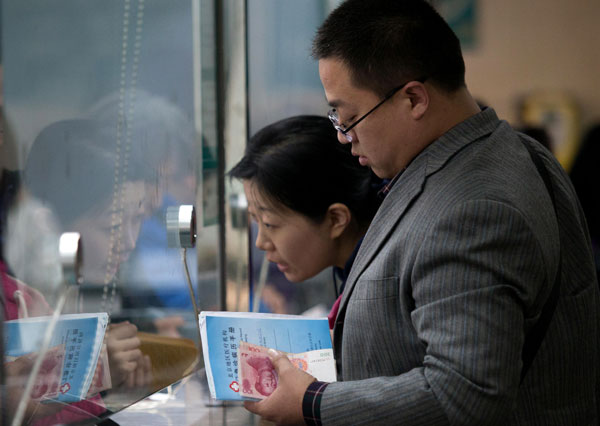Policy to bring medical benefit to rural poor
 0 Comment(s)
0 Comment(s) Print
Print E-mail China Daily, November 28, 2013
E-mail China Daily, November 28, 2013
Early in November, Chen Ping arrived in Beijing on what was likely to be her last trip to the capital.
|
|
|
Patients pay their medical bills at Beijing Tongren Hospital. [Mao Yanzheng / China Daily] |
The 52-year-old stayed just two days - long enough for her to say a heartfelt farewell to the doctors and nurses in the oncology department of the Chinese PLA General Hospital who have been treating her breast cancer for eight years.
Chen, who comes from a small village in Jilin province, wanted to express her gratitude to the medical staff for helping to extend her life.
She told the staff she was grateful to have lived long enough to see her sons grow up. However, as her illness is now in the terminal stages she has decided to stop receiving treatment.
One man Chen particularly wanted to see was out of town, so she was unable to say a last goodbye to Liu Duanqi, former director of the hospital's oncology department, who supervised her treatment.
Liu, looking tired after a working trip to Gansu province, said of Chen: "She's a peasant woman with a rural hukou (household registration). That means the only public medical insurance available to her is the New Rural Cooperative Medical Scheme."
The hukou system effectively ties a person to their place of birth and registration. It usually means that they are ineligible to claim social benefits or medical insurance if they receive treatment outside the place where they are registered.
"Under the medical insurance plan, patients can only go to hospitals at the district level, which usually means village or county level. Theoretically, a patient can be transferred to larger hospitals in the cities or provincial capitals if the condition is deemed too challenging for the local doctors, but that requires going through a procedure that can be daunting. As a result, it's extremely rare for a patient to be transferred outside of their home province," said Liu.
The reality facing Chen was that if she wanted to be treated at a hospital outside her hukou, for instance in Beijing, she would have to foot the bill herself, something the increasingly frail mother of two couldn't afford to do.
"Knowing that every penny that went into Chen's cure would be deducted from the funds in her bank account, which barely existed, the doctors tried to keep the disease under control and gave her an operation at minimum cost," recalled Liu. "When she left the hospital, I gave her a prescription that cost her half of 1 yuan (8 US cents) a day. She's been using the same prescription since then."






